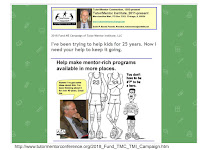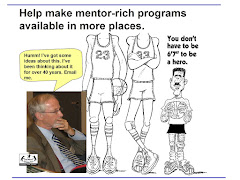While all of the attention is focused on mentoring, I think it's a good time to dig deeper, to understand the different types of mentoring strategies that exists, and the different youth and adults who are the intended beneficiaries of mentoring. Furthermore, let's once again look at roles volunteers can take beyond being a mentor, or without being a mentor.
Let's look at this graphic first:
All youth and adults would benefit from mentors helping them journey through life. However, much research shows that youth living in high poverty, segregated, and/or isolated, areas need more help to move from first grade toward their adult lives. Here's a concept map that illustrates this differently. People living in more affluent areas have more resources to help them overcome challenges. This page on the YEARUP web site illustrates this "opportunity divide" effectively.
Through the Tutor/Mentor Connection, started in 1993, and through the Tutor/Mentor Institute, LLC, started in 2011, I focus on youth living in high poverty areas of big cities like Chicago, where a wide range of mentoring, tutoring and learning supports are needed, in the lives of thousands of young people. Ideally, such programs should reach youth early and stay connected for many years, if the end result is a life out of poverty with a network of people to help achieve that goal.
The above graphic illustrates this long term commitment. It shows kids I connected with when they were in middle school, who I'm still connected with nearly 20 years later. Several have college degrees, including advanced degrees. These are just a few of the teens who were part of the tutor/mentor programs I led between 1975 and 2011.
While some children might join a tutor/mentor program when in elementary school others might not have access to this type of support until much older. Many mentoring formats focus on youth age 16-24 who have been involved in the juvenile justice system, or have dropped out of high school before graduation. Such program require many different types of support to help a young person get his/her life back on track.
Other mentoring formats, such as school based mentoring, are not structured for long-term connectivity. Many forms of involvement are "motivational speakers" or short duration classes. These are all part of a mix of needed services, but without at least one organization in a child's life offering a long-term support system, are the others enough to overcome the challenges poverty places in front of kids and families?
Regardless of when a tutor/mentor program first connects with a youth, the responsibility should be that the program, or other partners, provide a continuum of age appropriate learning, mentoring, experiences and work and skill-building opportunities that result in youth having the skills, education, network and opportunities needed to find work and build careers beyond the grasps of poverty. Here's a concept map that illustrates this differently, showing that at each age groups youth need a variety of supports. Few tutor/mentor programs can provide all of these.
Above is another set of graphics to stimulate your thinking. The middle one includes a map showing high poverty neighborhoods in Chicago. It also compares operating a tutor/mentor program, or being a teacher, to Thomas Edison. Each child is different, and constantly changing. Thus, leaders, volunteers, parents and educators must be constantly learning ..and experimenting, in order to offer the greatest benefit.
The question we should be asking ourselves, if our focus is on youth living in poverty, is "How can we fill all high poverty neighborhoods with organized, age specific programs, that can build and sustain long-term connections with children as the grow to become adults? How do we pay for it? Where do we attract and retain talented leaders? How do we keep volunteers involved for multiple years?
These are just a few of many questions to be asked an answered...in many places. For instance, of all of the organizations that offer mentoring, which focus on children living in high poverty poverty areas? Which have long-term strategies? Do cities have maps showing what neighborhoods are being reached with existing programs? Do they use that information to expand the number of kids reach every year?
Furthermore, who's providing the money and talent to collect, organize, analyze and share this information on a continuous basis?
So what role do volunteers, and people who don't have the time to meet directly, and regularly, with youth, take to make this happen? Here's one presentation titled "Mentor Role in a Larger Strategy". I hope you'll look at it.
The questions I've posted here just scratch the surface of the questions that might be asked. Visit this section of the Tutor/Mentor Web library and read the research articles. Visit this section and read the blog articles.
During this month, and throughout the year, I invite volunteers, program leaders, media, donors and policy makers to dig into this and other articles I've posted since 2005 on this blog, and in my library on Scribd.com. Do a Google search for "tutor mentor", then look at the images. You'll find dozens more intended to stimulate your thinking.
Build a deeper understanding of what types of programs serve the different needs of youth from different age groups and different social/economic backgrounds. Talk about proactive roles business, volunteers and donors can take to help strong, long-lasting tutor/mentor programs reach youth in more places. Create a "learning organization' where many are involved in this effort.
Every child is special. Every child deserves a support system that offers hope and opportunity. Some have this when they are born. Others won't have this unless many adults who don't live in poverty make a consistent, heroic, on-going effort to make such supports available.
If you're writing similar articles on your own blog, or host on-line forums where people are discussing these questions, use the comment box to share a link to your web sites or forums. I hope there are many leading this discussion.
Help me continue to write and share articles like this. Visit my FUND T/MI page and add your support.














No comments:
Post a Comment